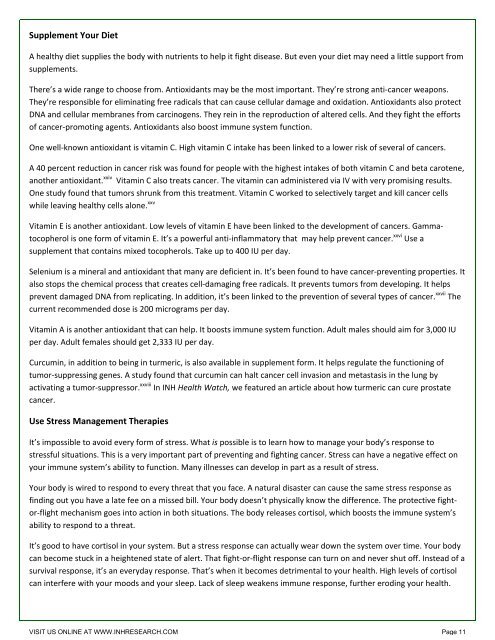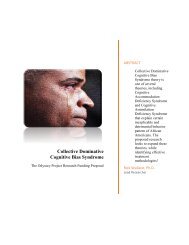Cut Your Cancer Risk in Half:
Create successful ePaper yourself
Turn your PDF publications into a flip-book with our unique Google optimized e-Paper software.
Supplement <strong>Your</strong> Diet<br />
A healthy diet supplies the body with nutrients to help it fight disease. But even your diet may need a little support from<br />
supplements.<br />
There’s a wide range to choose from. Antioxidants may be the most important. They’re strong anti‐cancer weapons.<br />
They’re responsible for elim<strong>in</strong>at<strong>in</strong>g free radicals that can cause cellular damage and oxidation. Antioxidants also protect<br />
DNA and cellular membranes from carc<strong>in</strong>ogens. They re<strong>in</strong> <strong>in</strong> the reproduction of altered cells. And they fight the efforts<br />
of cancer‐promot<strong>in</strong>g agents. Antioxidants also boost immune system function.<br />
One well‐known antioxidant is vitam<strong>in</strong> C. High vitam<strong>in</strong> C <strong>in</strong>take has been l<strong>in</strong>ked to a lower risk of several of cancers.<br />
A 40 percent reduction <strong>in</strong> cancer risk was found for people with the highest <strong>in</strong>takes of both vitam<strong>in</strong> C and beta carotene,<br />
another antioxidant. xxiv Vitam<strong>in</strong> C also treats cancer. The vitam<strong>in</strong> can adm<strong>in</strong>istered via IV with very promis<strong>in</strong>g results.<br />
One study found that tumors shrunk from this treatment. Vitam<strong>in</strong> C worked to selectively target and kill cancer cells<br />
while leav<strong>in</strong>g healthy cells alone. xxv<br />
Vitam<strong>in</strong> E is another antioxidant. Low levels of vitam<strong>in</strong> E have been l<strong>in</strong>ked to the development of cancers. Gammatocopherol<br />
is one form of vitam<strong>in</strong> E. It’s a powerful anti‐<strong>in</strong>flammatory that may help prevent cancer. xxvi Use a<br />
supplement that conta<strong>in</strong>s mixed tocopherols. Take up to 400 IU per day.<br />
Selenium is a m<strong>in</strong>eral and antioxidant that many are deficient <strong>in</strong>. It’s been found to have cancer‐prevent<strong>in</strong>g properties. It<br />
also stops the chemical process that creates cell‐damag<strong>in</strong>g free radicals. It prevents tumors from develop<strong>in</strong>g. It helps<br />
prevent damaged DNA from replicat<strong>in</strong>g. In addition, it’s been l<strong>in</strong>ked to the prevention of several types of cancer. xxvii The<br />
current recommended dose is 200 micrograms per day.<br />
Vitam<strong>in</strong> A is another antioxidant that can help. It boosts immune system function. Adult males should aim for 3,000 IU<br />
per day. Adult females should get 2,333 IU per day.<br />
Curcum<strong>in</strong>, <strong>in</strong> addition to be<strong>in</strong>g <strong>in</strong> turmeric, is also available <strong>in</strong> supplement form. It helps regulate the function<strong>in</strong>g of<br />
tumor‐suppress<strong>in</strong>g genes. A study found that curcum<strong>in</strong> can halt cancer cell <strong>in</strong>vasion and metastasis <strong>in</strong> the lung by<br />
activat<strong>in</strong>g a tumor‐suppressor. xxviii In INH Health Watch, we featured an article about how turmeric can cure prostate<br />
cancer.<br />
Use Stress Management Therapies<br />
It’s impossible to avoid every form of stress. What is possible is to learn how to manage your body’s response to<br />
stressful situations. This is a very important part of prevent<strong>in</strong>g and fight<strong>in</strong>g cancer. Stress can have a negative effect on<br />
your immune system’s ability to function. Many illnesses can develop <strong>in</strong> part as a result of stress.<br />
<strong>Your</strong> body is wired to respond to every threat that you face. A natural disaster can cause the same stress response as<br />
f<strong>in</strong>d<strong>in</strong>g out you have a late fee on a missed bill. <strong>Your</strong> body doesn’t physically know the difference. The protective fightor‐flight<br />
mechanism goes <strong>in</strong>to action <strong>in</strong> both situations. The body releases cortisol, which boosts the immune system’s<br />
ability to respond to a threat.<br />
It’s good to have cortisol <strong>in</strong> your system. But a stress response can actually wear down the system over time. <strong>Your</strong> body<br />
can become stuck <strong>in</strong> a heightened state of alert. That fight‐or‐flight response can turn on and never shut off. Instead of a<br />
survival response, it’s an everyday response. That’s when it becomes detrimental to your health. High levels of cortisol<br />
can <strong>in</strong>terfere with your moods and your sleep. Lack of sleep weakens immune response, further erod<strong>in</strong>g your health.<br />
VISIT US ONLINE AT WWW.INHRESEARCH.COM Page 11


















